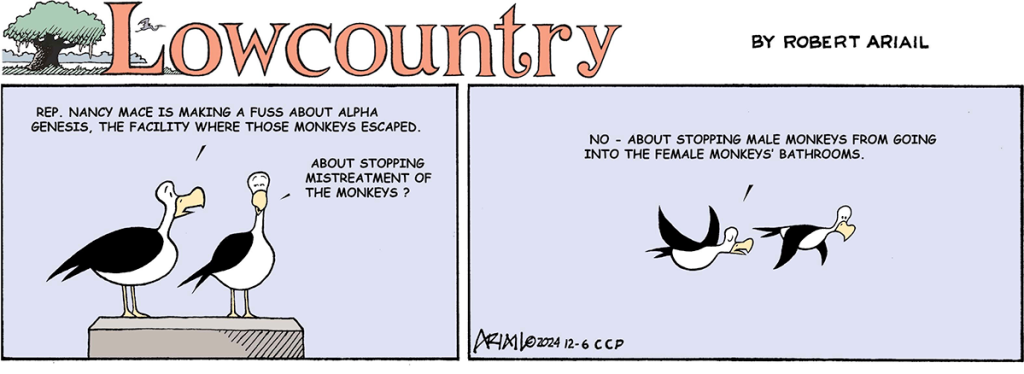STATEHOUSE REPORT | ISSUE 23.50 | Dec. 13, 2024
BIG STORY: GOP factions fight for power in next legislative session
MORE NEWS: Trump backs union in port negotiations
LOWCOUNTRY, Ariail: A simpler way to indoctrinate?
BRACK: 10 tips for more effective writing, communication
SPOTLIGHT: The S.C. Education Association
ANOTHER VIEW: No education in third kick of voucher mule
MYSTERY PHOTO: Quackers
FEEDBACK: Use schools as voting sites
GOP factions fight for power in next session

By Jack O’Toole, Capitol bureau | For Republicans old enough to remember President Ronald Reagan’s once-hallowed 11th Commandment – “Thou shalt not speak ill of a fellow Republican” – last week’s knives-out GOP infighting over leadership positions in the state legislature’s 2025-26 session might have seemed like a sin against party unity.
But according to long-time Palmetto State political observers like Beaufort Republican Sen. Tom Davis, it was just the inevitable consequence of now-unchallenged GOP power in South Carolina — and a clear sign of things to come.
“The larger a majority party gets, the more likely it is to splinter,” Davis told the Statehouse Report this week. “Eventually, you start debating amongst yourselves instead of debating with the other side because it’s a foregone conclusion that whatever you promote is going to get passed.”
As a result, Davis says, the larger a majority becomes and the longer it stays in power, the harder it is to stay focused on issues with strong support in every wing of the party.
“Everybody comes to Columbia with different priorities,” Davis said, noting that today’s GOP majority is made up of social conservatives, libertarian conservatives and populist conservatives. “So you start with the issues everyone agrees on, but sooner or later you get to a point where you’ve exhausted those and then it’s a question of which faction will hold sway with the remaining issues.”
And that broader intra-party fight, most political watchers say, is what South Carolinians saw begin to play out last week in the General Assembly — particularly in the House, where Speaker Murrell Smith, R-Sumter, had to fend off a leadership challenge from members of the comparatively small, but populist, hard-right S.C. Freedom Caucus.
The hard-right perspective
Controversial since its founding in 2022, the 17-member S.C. House Freedom Caucus quickly rose to prominence in Palmetto State politics by publicly accusing GOP leaders of selling out conservative principles in service of what it calls a moderate, “Uniparty” agenda.
Tensions arising from those charges broke out repeatedly on the House floor in the 2023-24 session, with one GOP member going so far as donning a tinfoil hat to mock the group’s support for making gold and silver legal tender in the state.

“I want you to support this amendment because I want you to stop thinking, too,” S.C. Rep. Micah Caskey, R-Lexington, said sarcastically from the rostrum, hat on head. “This allows us to trade genie lamps in for our parking tickets.”
But according to the new chair of Freedom Caucus, S.C. Rep. Jordan Pace of Berkeley county, its members are simply holding Republicans accountable for their promises.
“We just want people to vote the way they campaign,” Pace said in a Dec. 9 interview. “When somebody campaigns as a solid conservative and they don’t vote that way, well, that’s what we have a problem with.”
Moreover, he argues, the group’s agenda of deep tax and spending cuts, closed party primaries and further action on social issues like a no-exceptions ban on abortion are precisely what voters gave Republicans a supermajority to do.

That’s why caucus members challenged Smith last week, he says, and why they plan to keep fighting for what they see as governmental and political reform throughout the next session.
“Whoever is in power determines policies,” Pace said. “And in recent memory, people in leadership positions have been more willing to broker deals with the Democrats and the moderate wing of the Republican caucus than they are with the conservatives.”
Institutionalists vs. idealogues
Republican insiders tell Statehouse Report that this escalating fight between idealogues like Pace and institutionalists such as Smith will determine the shape of major legislation as the session gets underway in January.
And according to some, the greatest political strength of the caucus — its unwillingness to compromise on what members say are core principles — is also its greatest weakness when it comes to getting things done.
“They wouldn’t like to hear this, but they would be more effective if they looked for common ground,” said longtime Republican consultant Chip Felkel. “One of the things they don’t understand is that compromise is not a four-letter word.”
At least to date, Felkel says, that attitude has been the source of much of their own frustration.
“They see themselves as enlightened warriors for truth and justice,” Felkel said. “But they tend to waste time fighting about bills that have no chance of passing and then attacking leadership because they didn’t get their way.”
Growing right wing of the Senate

On the Senate side, Davis sees much the same battle shaping up, with a growing hard-right contingent agitating for institutional changes to make the body more responsive to the wishes of GOP primary voters.
“There’s a tension between those who want the Senate to act with more dispatch, and those of us who see the Senate as the chamber that deliberates and has checks and balances that allow everyone to be heard,” Davis said.
For instance, in the last session, a minority of GOP members was able to successfully hold the floor and argue for a six-week ban on abortion, rather than the complete ban favored by many. But with more populist senators in the chamber next year, Davis says it will be harder to slow down debate and fully discuss the policy implications.
Resolving that tension, he added, will likely be the main challenge GOP leaders face in the new year.
“I think that’s what’s going to make 2025 very interesting from a political perspective,” Davis said.
- Have a comment? Send to: feedback@statehousereport.com.
Trump backs union in port negotiations

By Jack O’Toole, Capitol bureau | South Carolina leaders’ longstanding feud with the labor union representing dockworkers at state-owned ports took a surprising political turn Tuesday when President-elect Donald Trump sided with union officials on a key issue – further automation at U.S. port facilities.
“Just finished a meeting with the International Longshoremen’s Association and its President, Harold Daggett, and Executive VP, Dennis Daggett,” Trump wrote Dec. 12 in a social media post. “There has been a lot of discussion having to do with ‘automation’ on United States docks. I’ve studied automation, and know just about everything there is to know about it. The amount of money saved is nowhere near the distress, hurt, and harm it causes for American Workers, in this case, our Longshoremen.”
Trump’s union-friendly comments came after a year of mounting political tensions between state officials and the ILA.
“We will fight all the way to the gates of hell,” McMaster said of labor unions in his January State of the State address, after specifically discussing state port disputes with the ILA. “And we will win.”
In an angry video response, ILA President Harold Daggett called McMaster “a disgrace.”
Later that same month, the state lost a major legal battle with the union when the U.S. Supreme Court refused to hear South Carolina’s appeal of a lower-court ruling that okayed the use of ILA members, rather than state employees, in certain port jobs.
Tensions peaked in October when McMaster and U.S. Sen. Lindsey Graham, R-S.C., implored President Joe Biden to order ILA members back to work after a strike briefly shut down East Coast port facilities, including the state’s largest port in Charleston. Shortly thereafter, ILA officials agreed to voluntarily suspend the strike in return for an agreement on higher pay and further negotiations on the issue of automation.
After this week’s meeting at Mar-A-Lago, Daggett expressed gratitude for Trump’s backing on the issue.
“I am so grateful to President Donald Trump for his courageous support for American ILA longshore workers,” Daggett said. “He totally understands the threat that automation and semi-automation has in destroying jobs and families.”
Negotiations are ongoing between the ILA and the United States Maritime Alliance, the consortium representing carriers and port associations. In December, the union warned it will strike again if all outstanding issues, including automation, aren’t settled in a new master contract by Jan. 15, 2025.
In other recent news
![]() South Carolina’s Porgy House faces an uncertain future. The house where George Gershwin wrote “Porgy and Bess” is for sale on Folly Beach, where soaring home values, a lack of protection for historic homes and the constant threat of hurricanes and rising waters leave the future of the landmark at risk.
South Carolina’s Porgy House faces an uncertain future. The house where George Gershwin wrote “Porgy and Bess” is for sale on Folly Beach, where soaring home values, a lack of protection for historic homes and the constant threat of hurricanes and rising waters leave the future of the landmark at risk.
McMaster wants mental health, disability departments in his cabinet. A federal lawsuit against the state for its treatment of the mentally ill has led Gov. Henry McMaster to push again for gubernatorial control of the Department of Mental Health and Department of Disabilities and Special Needs.
Audit shows ongoing problems with state’s juvenile justice system. A new Legislative Audit Council report finds slow progress at the S.C. Department of Juvenile Justice after a 2022 federal settlement required major reforms in the way the agency does business.
State senator proposes using lottery dollars for vouchers. S.C. Sen. Greg Hembree, the Horry County Republican who chairs the Senate Education Committee, has proposed spending State lottery dollars in the budget to get around a constitutional prohibition on spending taxpayer dollars for vouchers.
S.C. education officials ask to raise starting teacher pay to $50K. The salary floor for teachers this school year is $47,000, as set by the state budget. But education officials are asking legislators for $200 million in its budget to raise the pay to $50,000 by July 2025.
Higher price and income limits expand S.C. homebuyer assistance and tax credit for 2025. A combination of high prices and elevated mortgage interest rates have strained potential homebuyers, but home-price limits and income limits for several state housing initiatives have also increased.
Feds sue S.C. for violating ADA. The U.S. Justice Department has sued the state of South Carolina claiming the state is “unnecessarily segregating adults with mental illnesses in adult care homes.”
A simpler way to indoctrinate?

Nationally award-winning cartoonist Robert Ariail always has an interesting take. This week, he takes a look at the conflict over how the state Department of Education is using a right-wing content provider to teach.
- What do you think … love it or hate it? Did he go too far, or not far enough? Send your thoughts to feedback@statehousereport.com.
10 tips for more effective writing, communication

Commentary by Andy Brack | Good writing and effective communication go hand-in-hand. When asked to share how to write better – particularly in days when people use emojis and new acronyms (LMAO) faster than a speeding bullet – we often suggest an oldie but a goodie: Strunk and White’s “The Elements of Style.”
 The book started as a short guide to better writing for students in Cornell University English professor Will Strunk’s classes after World War I. Celebrated writer E.B. White, once a Strunk student, updated it for broad dissemination in the late 1950s.
The book started as a short guide to better writing for students in Cornell University English professor Will Strunk’s classes after World War I. Celebrated writer E.B. White, once a Strunk student, updated it for broad dissemination in the late 1950s.
“Will felt that the reader was in serious trouble most of the time, floundering in a swamp, and that it was the duty of anyone attempting to write English to drain this swamp quickly and get his man up on dry ground, or at least throw him a rope,” White explained in his introduction.
Here are some writing tips gleaned from 40 years of writing. Some are in the book. Others are based on experience. All of them work and help to keep the writer on dry ground.
Use short, simple sentences. The more words that are in a sentence make it harder for readers to comprehend and understand, according to readability studies. Therefore, write short, simple sentences with a subject-verb-object structure. Fancy opening clauses or phrases in the middle of the action are distracting. Keep it simple. And if it gets too complex, split it into two or more sentences.
Be concise. Our version of this tip is one word shorter than Strunk’s “Omit needless words.” He explained a sentence does not need extra words, just as a good drawing doesn’t need extra lines. Each word in a sentence should count.
Be specific. Don’t write about something as merely brown. Instead, perhaps describe it as cardboard box brown. Or pumpkin spice brown. Rather than writing about a few swans, make the sentence sparkle with a description of nine honking swans.
Highlight sensory details. If you’re writing about something that smells, describe the smell. If it is loud, illustrate how loud. If it tastes horrible, share what it tastes like.
Don’t back into sentences. This is a pet peeve. But backing into sentences with phrases before the subject-verb action drives us nuts. Bad: Today as the school let out, children raced out of classrooms. Better: Children raced out of classrooms today when school ended.
Use the active voice. Strunk and White ask which is better: “My first visit to Boston will always be remembered by me.” Or “I will always remember my first visit to Boston.” Using the active voice is more direct and vigorous. Get rid of passive voice. The easiest way to tell is that verbs in passive voice usually have a couple of words, such as “had visited” or “have heard.” (Why not just “visited” or “heard”?)
Use pronouns correctly. In this day of political correctness, more people are using “they” as pronouns replacing “he” or “she.” This promotes murky, unclear writing and ineffective communication. If you prefer the distracting “they,” consider writing around the need for a pronoun by using the name or stick to using “he” or “she.”
No run-on sentences or fragments. Part of this rule is from my dad, a career journalist. His rule is simply: “About them sentence fragments,” illustrating an incomplete thought. Similarly, run-on sentences are too many thoughts jammed into one mind-numbing, confusing sentence.
Rewrite. Your first draft is never your best draft. Any decent editor will tell you that good writing is really all about rewriting to promote better, clearer communication.
Spellcheck. Computers allow us to spellcheck. Nevertheless, there’s also a great value of reading your masterpiece aloud. You might be surprised how much you can improve something if you hear it after writing it.
Most of all, use common sense when you write. It will make for better writing and better communicating.
Andy Brack is editor and publisher of Statehouse Report and the Charleston City Paper. Have a comment? Send to: feedback@charlestoncitypaper.com.
The S.C. Education Association
 The public spiritedness of our underwriters allows us to bring Statehouse Report to you at no cost. This week’s spotlighted underwriter is The South Carolina Education Association(The SCEA), the professional association for educators in South Carolina. Educators from pre-K to 12th grade comprise The SCEA. The SCEA is the leading advocate for educational change in South Carolina. Educators in South Carolina look to The SCEA for assistance in every aspect of their professional life. From career planning as a student to retirement assessment as a career teacher, The SCEA offers assistance, guidance, and inspiration for educators.
The public spiritedness of our underwriters allows us to bring Statehouse Report to you at no cost. This week’s spotlighted underwriter is The South Carolina Education Association(The SCEA), the professional association for educators in South Carolina. Educators from pre-K to 12th grade comprise The SCEA. The SCEA is the leading advocate for educational change in South Carolina. Educators in South Carolina look to The SCEA for assistance in every aspect of their professional life. From career planning as a student to retirement assessment as a career teacher, The SCEA offers assistance, guidance, and inspiration for educators.
- Learn more: TheSCEA.org
No education in third kick of voucher mule

NOTE: This editorial originally was published in the Charleston City Paper.
South Carolina Republicans have tried to craft a private school voucher plan that could pass constitutional muster for years – and twice since 2020. Both recent incidents got them a solid “F” from the state Supreme Courts.
S.C. Senate Education Committee Chairman Greg Hembree’s response heading into 2025? Hold my beer.
The new plan from Hembree (R-Horry), which was unveiled at a committee hearing this week, is substantially similar to previous GOP efforts in that it funnels public money into private schools.
Which, of course, is precisely what the Supreme Court keeps trying to tell them is unconstitutional.
But Hembree now says he’s cracked the code — that one weird trick that will magically make vouchers legal in South Carolina.
Under this plan, the legislature would pay for the vouchers with state lottery money instead of state general fund money. And everybody knows that lottery money isn’t really public money.
Right. Even though it’s sitting in state bank accounts. And even though state legislators like Hembree are the public’s stewards to spend it.
But as critics have pointed out, the real problem with voucher efforts is that they don’t pass the laugh – or public smell – test.
Why? Because they use public money to pay for private schools. And that’s just wrong.
As S.C. Education Association President Sherry East told the S.C. Gazette this week, the whole scheme amounts to “putting lipstick on a pig.”
“You can call it something different [with the lottery money] but the consequences to public schools will still be the same,” East said.
And as the latest test scores show, South Carolina’s children — more than 90% of whom attend public schools — can’t afford those consequences.
According to the S.C. Department of Education, fewer than one-third of 8th graders in South Carolina are currently doing math at grade level and only about half meet expectations in reading. And when you drill down, the numbers were even worse for minority students, as the City Paper noted in a previous editorial.
“In the 8th grade, just 13% of Black children are meeting expectations in math, 34% in reading. Unsurprisingly, the news for 8th grade Hispanic kids isn’t much better – 23% are succeeding in math, 40% in reading. And finally, perhaps explaining those two results, only 19% of students in poverty are working at grade level in math, 40% in reading.”
Long story short: S.C. public schools are already struggling to educate our kids in K-12 schools. And a voucher program that steals desperately-needed public resources intended for college students isn’t a solution for that problem, particularly when the voucher program is capped at 15,000 students, a tiny fraction of the state’s 800,000 K-12 population.
Perhaps the most famous words ever uttered on the subject of education in South Carolina were those of Democratic U.S. Sen. Fritz Hollings, who once wryly noted, “There’s no education in the second kick of a mule.”
South Carolina Republicans, who’ve already twice ignored that bit of simple wisdom by failing to get vouchers past the state Supreme Court , should consider it carefully before they push through yet another voucher bill — and risk a third kick in 2025.
Quackers

What is this a picture of and why might it be important? Be specific, including the artist for full credit. Send your name, hometown and guess to: feedback@statehousereport.com.
 Last week’s mystery, “Home on the range,” showed the damage done in 1958 to a Mars Hill home in Florence County after an unarmed atomic weapon was accidentally dropped on it.
Last week’s mystery, “Home on the range,” showed the damage done in 1958 to a Mars Hill home in Florence County after an unarmed atomic weapon was accidentally dropped on it.
“Thankfully, the bomb did not have its fissile nuclear core rod installed at the time of the accident, but the conventional, high-explosive device that is used to trigger a nuclear explosion did detonate, causing damage to several buildings in the area and injuring six individuals,” wrote Allan Peel of San Antonio, Texas.
“It is worth noting that if the nuclear rod had been installed in the bomb that fell on [Walter] Gregg’s yard, it would have destroyed everything within a 10-mile radius, and the radiation fallout would have likely killed thousands in Horry County, S.C. and Wilmington, N.C. Rather than asking what makes the photo interesting, perhaps the real question should be what makes this photo terrifying?
Others correctly identifying the photo were: Will Bradley of Las Vegas, Nevada; Frank Bouknight of Summerville; Truett Jones of Summerton; Bobby Ridgeway of Manning; Bill Segars and Don Clark, both of Hartsville; Jacie Godfrey of Florence; George Graf of Palmyra, Va.; Steve Willis of Lancaster; Penny Forrester of Tallahassee, Fla.; David Lupo of Mount Pleasant; David Taylor of Darlington; Elizabeth Jones of Columbia; and Pat Keadle of Perry.
- Send us a mystery picture. If you have a photo that you believe will stump readers, send it along (but make sure to tell us what it is because it may stump us too!) Send to: feedback@statehousereport.com and mark it as a photo submission. Thanks.
Use schools as voting sites
To the editor:
When I was in junior high school, if there were an election scheduled, we had the day off. They had the electric voting booths lined up out in front of the main offices. People entered the school at the far end of the elementary school and walked slowly toward the voting site. I seem to remember that they then left by the front door of the school.
Easy peasy….yes? No one is offended by photos of the principal, office secretary et alia. It’s warm enough in the cold weather or cool enough in the late springtime.
– Pat Keadle, Perry, S.C.
Send us your thoughts
We encourage you to send in your thoughts about policy and politics impacting South Carolina. We’ve gotten some letters in the last few weeks – some positive, others nasty. We print non-defamatory comments, but unless you provide your contact information – name and hometown, plus a phone number used only by us for verification – we can’t publish your thoughts.
- Have a comment? Send your letters or comments to: feedback@statehousereport.com. Make sure to provide your contact details (name, hometown and phone number for verification. Letters are limited to 150 words.
- Send us a mystery picture. If you have a photo that you believe will stump readers, send it along (but make sure to tell us what it is because it may stump us too!) Send to: feedback@statehousereport.com and mark it as a photo submission. Thanks.
ABOUT STATEHOUSE REPORT
Statehouse Report, founded in 2001 as a weekly legislative forecast that informs readers about what is going to happen in South Carolina politics and policy, is provided to you at no charge every Friday.
- Editor and publisher: Andy Brack, 843.670.3996
- Statehouse bureau chief: Jack O’Toole
Donate today
We’re proud to offer Statehouse Report for free. For more than a dozen years, we’ve been the go-to place for insightful independent policy and political news and views in the Palmetto State. And we love it as much as you do.
But now, we can use your help. If you’ve been thinking of contributing to Statehouse Report over the years, now would be a great time to contribute as we deal with the crisis. In advance, thank you.
More
- Mailing address: Send inquiries by mail to: P.O. Box 21942, Charleston, SC 29413
- Subscriptions are free: Click to subscribe.
- We hope you’ll keep receiving the great news and information from Statehouse Report, but if you need to unsubscribe, go to the bottom of the weekly email issue and follow the instructions.
- Read our sister publication: Charleston City Paper (every Friday in print; Every day online)
- © 2024, Statehouse Report, a publication of City Paper Publishing, LLC. All rights reserved.


